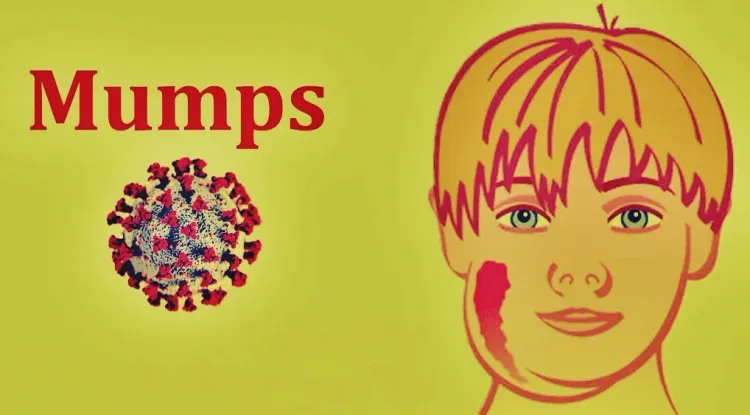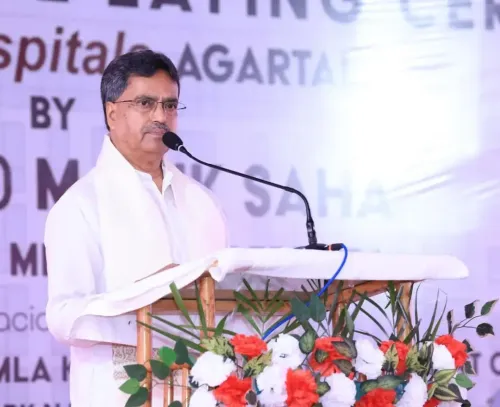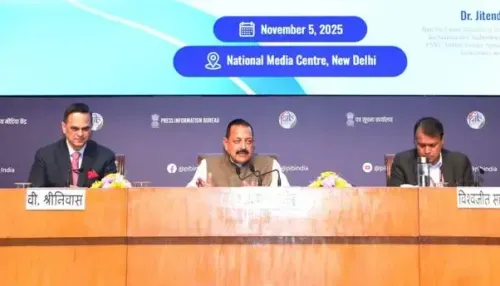Tamil Nadu Raises Alarm as Mumps Cases Surge Among Schoolchildren in Coimbatore

Synopsis
Key Takeaways
- High alert issued by Tamil Nadu Health Department.
- 21 KG students tested positive for mumps.
- School holidays declared until March 12.
- Symptoms to watch for include fever and gland swelling.
- Vaccination recommended to reduce risks.
Chennai, March 8 (NationPress) The Tamil Nadu Health Department has raised a high alert as incidents of mumps continue to escalate among children in Coimbatore.
Officials have ramped up surveillance and preventive initiatives after 21 kindergarten (KG) pupils from a matriculation school in Peelamedu tested positive for the viral infection in the last two days.
In response to the outbreak, the school administration has declared a holiday until March 12 to mitigate further spread.
Health officials from the Coimbatore City Municipal Corporation reported that 13 KG students exhibited symptoms two days ago.
The school management acted swiftly, sending them home to stop the infection from spreading. Health department representatives have reassured the public that there is no reason for alarm.
However, those experiencing symptoms of measles, mumps, or chickenpox should seek medical care at the nearest government facility immediately.
Mumps is a highly contagious viral illness that primarily impacts children but can also affect adolescents and adults.
It typically leads to swelling of the parotid salivary glands on one or both sides of the face, causing pain and discomfort. Additional symptoms may include fever, headache, muscle aches, difficulty chewing, and fatigue.
The virus is transmitted through respiratory droplets from coughing or sneezing and remains contagious from shortly before gland swelling begins up to five days afterwards. Infected individuals should minimize contact with others, rest appropriately, and stay hydrated until recovery.
While mumps is generally viewed as a mild, self-limiting illness, it can result in complications, especially in unvaccinated children.
A study conducted by the Tamil Nadu Directorate of Public Health (DPH) using data from the Integrated Health Information Portal (IHIP) under the Integrated Disease Surveillance Programme (IDSP) has pointed to a troubling rise in mumps cases statewide.
The report indicated that the incidence rate of mumps per lakh population rose from 0.07 in 2021-22 to 1.30 in 2023-24.
Many cases are suspected to be underreported since mumps is not classified as a notifiable disease, and some medical facilities do not record cases. Between April 2021 and March 2024, Tamil Nadu documented 1,281 presumptive mumps cases, with 56.05 percent of them involving women.
The study revealed that 70 percent of cases occurred among children under nine years of age, with 10 percent in the 10-19 age group. There has been a consistent increase in reported cases over the years. In 2021, of approximately 2,261 cases, Coimbatore represented 15 percent and Dharmapuri 11 percent.
In the meantime, during 2022-23, at least 129 cases were recorded with Thiruvarur district contributing 51 percent, Nagapattinam 11 percent, and Chennai 4 percent. In the current year, the state has logged 1,091 cases.
Health experts have indicated that these trends may be influenced by environmental changes, population dynamics, and fluctuations in vaccination rates.
Although mumps-related complications are infrequent, particularly in children, doctors stress that the risk of severe outcomes can be notably reduced through vaccination.
India introduced the measles vaccine under the Universal Immunisation Programme (UIP) in 1985 and later included the combined Measles-Rubella (MR) vaccine in 2017 with the aim of eliminating both diseases by 2020.
The DPH study advocates for making mumps a notifiable disease in Tamil Nadu to enhance monitoring and control measures. It also recommends incorporating the mumps vaccine into the UIP schedule according to Union Government guidelines to avert further outbreaks.









